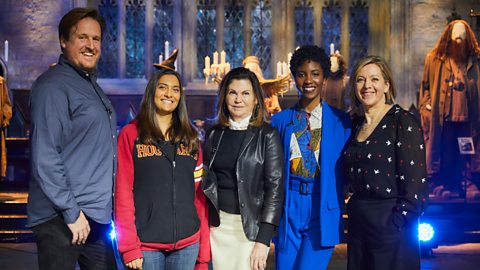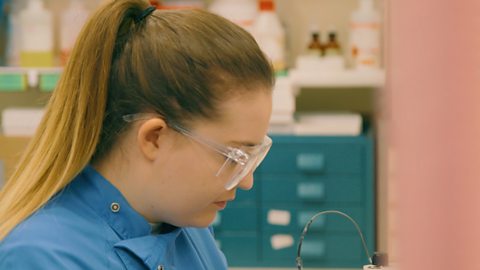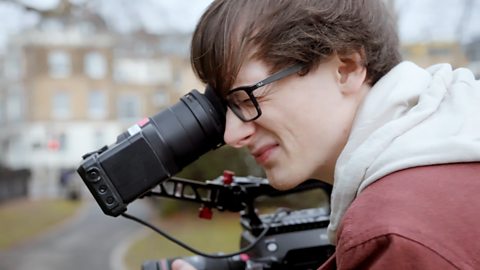Radio 1 is well-known for bringing you all the latest hits, but what's life like behind the scenes?
The Young Reporter team went behind the scenes of some popular BBC brands to find out which jobs go into making hit content.
Join presenter Arielle Free, assistant producer Daisy Jarrett, podcast commissioning producer Leanne Alie and music editor Matt Fincham for a sneak peek into their job roles.
Arielle Free, presenter
It’s not just a presenter role that’s available in radio. A lot of people start as a team assistant and then go into the music team, and then when they’re in the music team, they realise they prefer the production side of things. There’s real avenues that allow you to cross over.
Arielles' top tip
If you want to be a presenter and it said in your school report that you talk too much, use it as ammunition to get a career on the radio.
Arielle Free
Hello. I'm Arielle Free and I present the Early Breakfast Show, Monday to Thursday up on Radio 1.
For me, talking has always been one of my main skills. In fact, in every school report, it would be like teachers are saying "Arielle's good, she kind of works hard, but she needs to stop talking!" and it's quite funny because now I can basically say that I've made acareer out of it! I often have people say to me "You just constantly talk. Like, there's just content!" So, I feel like presenting, for me, was always going to be the route that I wanted to take.
So, although I host and present the show, to make that three-hour show live or pre-recorded I usually have to have a producer with me. And if it's a daytime show you'll have a producer and a TA which is a team assistant, and their job is to help make our ideascome alive on the radio. Alongside my producers I've worked really closely with the music team. Their job is to give you, well, give me kind of all of the information on the newest releases, the artists that maybe I shall be looking at and it's a real team effort. So even though I'm the one in front of the mic, to get that point of actually making a show I have to have my producer. You have to have the music team and then alongside them you've got all these incredible other roles such as the live events team.
So, it's not just the presenter role that is available in a radio station. In fact, a lot of people start somewhere, maybe the start as a TA and then they go into the music team or they start in the music team and they actually realise that they much prefer to be in theproduction side of things. And there's real avenues to allow you to crossover there. Also, we now have BBC Sounds which has a lot of podcast content, which is completely different in terms of how you make and produce that, there's just so many different opportunities that's not just being a presenter behind the mic.
I would say if you wanna go down the music curation route, the easiest thing is to create playlists on whatever you use as your streaming service. Like, make different themed ones. If you want to DJ, maybe the music you would play in sets or if you're a champion of new artists, new bands, have a discovery playlist where people can find the next latest thing.
If you want to be a presenter and it said on your school report card every time that he talked too much just ignore it and just use it as ammunition to get that career on the radio.

Daisy Jarrett, assistant producer
When I finished uni, I moved to London, got a job in an office and tried to get any kind of experience on radio. I did shows of my own on community radio stations and tried to do as much radio as I possibly could until a team assistant job came up at Radio 1 and 1Xtra.
Daisy's top tip
Become an absolute expert at the thing that you like… that’s how you’ll be really good at the job you end up doing.
Daisy Jarrett
Hi, I'm Daisy. I'm an assistant producer at Radio 1 and 1Xtra so make radio shows for the Breakfast Show on Radio 1 and specialistshows on 1Xtra.
I didn't love school. I just did subjects that I thought would be fun to do so I did English and Drama and Film Studies, but, really, I was just focused on maybe going into something media-related and Drama and English properly tapped into that.
So, I wouldn't say my route into radio was really completely smooth. I went to uni in Nottingham to Nottingham Trent and I did Broadcast Journalism and did loads of student radio and I joined the student radio station there and I was head of music on the station and I'd always loved Radio 1. So, I kind of set my sights on going there. So, when I finished uni, I moved to London and got a job in an office and just tried to get any kind of experience. So, radio stations at the weekend. I did shows of my own on community radio stations and just really tried to do as much radio as I possibly could. Until the opportunity came up for a team assistant job at Radio 1 and 1Xtra. So, I applied for that. And then got the job, but it was like a freelance job so I needed something flexible at the same time I could do so I could be on hand for any shifts that came up. So, I also worked at the same time in a call centre in Brixton. Just to make some money to support myself living in London and I did that for a couple of years until eventually a contract came up. Applied for that managed to get that. And that was two and a half years ago now. And yeah, we launched a breakfast show and it's been amazing.
A regular day on the breakfast show starts when I wake up about 4:30am and from 4:30am up until when the show starts at 7am it's very much getting as much content as you possibly can. So, scrolling Twitter, scrolling Instagram and seeing what's happened in the news, looking up what's going on in the world, up until the show starts, and then, from when the show's on, it's just as busy. We are looking at tweets, we're looking at the texts that are coming in. We're calling back people to see if they fancy coming on the show and then, after the show, your pre-recording stuff for stuff that you're going to play on the show the next day. So, the rest of the day is pretty much planning for the week of shows and all the projects and the fun stuff and booking the guests to come in and it's very busy up until when the day finishes in the afternoon.
Honestly, just go for something that you're really interested in. So, if you think "I'm quite interested in music" listen to loads of music. Like, this is the time where you just you need to just become an absolute expert at the thing that you like. So, go for things that you're really interested in and that's how you'll be really good at the job that you end up doing regardless of what it is.

Leanne Alie, podcast commissioning producer
The journey into the role that I am in now was pretty unconventional. I’m very passionate about diversity inclusion and that comes out in all the work I do. I decided I needed to learn production as a way to progress in the industry.
Leanne's top tip
If it’s your type of thing, make a podcast yourself. You can literally start podcasting from your bedroom.
Leanne Alie
My name is Leanne. I'm a commissioning producer in the BBC Sounds 'pop-hub' team and that means I look after development ofpodcasts across mainly Radio 1, 1Xtra and Asian Network.
I really enjoyed school. I was always a super, super creative, I love doing art and for the longest time I actually thought I was going to be a fashion designer so I was, like, super into textiles, I even designed my own prom dress when I left in Year 11 and it was justso fantastic! And I genuinely thought that was the path I was gonna go down but, as soon as I left university, that changed completely.
The journey into the role that I'm in now I think was pretty unconventional because I actually started out working in marketingand, off the back of that, I started doing some diversity consulting in the audio space as I realised that that was kind of an industry that was untouched by that sort of work and I'm very passionate about diversity and inclusion and that comes out in all the work that I do.
I decided that I needed to learn production cos that was going to be a way that I could kind of progress in the industry. Then, afterspending some time in that role, I saw this job advertised at the BBC which was completely in line with all the things that I'm passionate about which is podcasting and commissioning and developing diverse stories.
To summarise, what my role entails is either working from the development stage and the briefing stage where we kind of have ideas in development and working with the production team to really develop the podcast ideas and the talent and bring those tolife. It also involves developing the look and feel of the podcast, so, what's the artwork gonna look like? How's it going to sound with the imaging? And how are we going to market it? And then, kind of once we've gone through this development stages, it's about pushing out into the world and basically making sure that the podcast is the best that it can be.
My top tip if you are interested in getting into the podcast industry is, if it's your type of thing, make a podcast yourself. If you wanna be the host, be the host, if you'd rather be behind the scenes, find a podcast that is out there and be the producer of that podcast. The more you know and learn about what it means and what it takes to create a podcast, the better you can apply your skills into having a career in podcasting. Literally anybody can do that – you can literally start podcasting from your bedroom. So, I would definitely encourage you to kind of start putting in the content that you want to make.

Matt Fincham, music editor
After school and university I did a lot of work experience at local radio stations. I sent a lot of emails to a lot of people saying, ‘Hey can I come in and get some experience?’.
Matt's top tip
Show something that embodies you or demonstrates your ability.
Matt Fincham
Hi, I'm Matt Fincham and I am the editor on the Radio 1 music team.
So, I'm responsible for all the music you hear throughout daytime Radio 1. So, I was a bit of a swot at school, I did work very hardand I would say probably my favourite subjects were English. I loved creative writing. I also like languages, I studied French andGerman, but I studied Music as well and that was one of my favourite subjects.
So, there's no clear or sort of obviously defined route to get into radio. Everyone has their own story. For me, it was a lot of workexperience. So, after I studied at school, and then I went to university, I did a lot of work experience at local radio stations. Ialso worked on internet radio stations and I sent a lot of emails to people just saying "hey, can I come in and get some experience?" I made lots of cups of tea. I don't drink coffee so I had to learn quite quickly how to make a good cup of coffee for people and basically absorbed all that was going around me. So, I sat in on radio shows, I sat in production offices, I shadowed the music team at stations and just really got an operational understanding of how radio works and how music worked on radio.
So, I'm responsible for the day-to-day running of the music team and part of that is the Radio 1 playlist. That's probably the mostimportant part of my job. We have a weekly meeting every Tuesday where we decide all of the records we're going to play on Radio 1 in that week. So, we will decide, say, if a certain record gets played lots of times or one that only gets a few plays because it's a brand new artist. So, inevitably a big part of my job is listening to a lot of music. I know that sounds quite dreamy. We do get played quite a lot of bad music I have to be honest. But it's my job and my team's job to filter through that and make sure that the best music prevails, so what you hear on Radio 1 is the very best.
One of the parts of the job I really do relish is booking our events. So, every May, Radio 1 has an event called Radio 1's Big Weekend, where we'd go to a town or a city in the UK and have 70,000 people descend for the weekend and see loads of bands and artists perform live. It really is quite a thrill.
I think one of the most important things to do when you're applying for work experience or a job in the music industry or in radio is to demonstrate your passion. I would say we don't expect people to be fully formed when they come to Radio 1. Just give us some inkling of passion or something that you're really into. So, if you want to be a presenter, share some content that you've worked on. It doesn't have to be on a huge platform had a million views on YouTube, just show us something that embodies you or demonstrates your ability as a presenter. If you're a musician, don't send a 101 demos. Send your best track and explain why it's so important to you and why this is the one that really embodies you as an artist. Demonstrate your passion. Demonstrate your zeal and love for radio and for music and that is the most important thing that we would need to see.

Making the Magic: Inside jobs in film. collection
Are you spellbound by the Wizarding World films? Meet the people who work in the film industry and make the magic happen.


